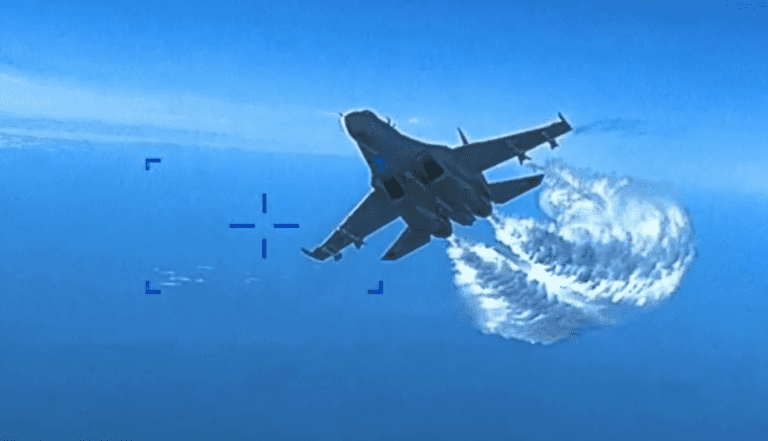This article was originally published by Radio Free Europe/Radio Liberty and is reprinted with permission.
Russia targeted Ukrainian cities with another barrage of overnight drone and missile attacks, killing at least two people and wounding at least 10 others, Ukrainian officials said on July 12.
The new air attacks came ahead of what US President Donald Trump, who has been seeking to end the war in Ukraine since he took office in January but has run up against recalcitrance from President Vladimir Putin’s Kremlin, said would be a “major statement on Russia” on July 14.
Cities in western Ukraine bore the brunt of the latest overnight attacks, in which Ukraine’s air force said it shot down 319 of the 597 drones and all but one of the 26 missiles launched by Russian forces.
A 26-year-old woman and a 43-year-old man were killed and at least four other people injured as a result of drone strikes on Chernivtsi, near the Romanian border, regional military administration chief Ruslan Zaparanyuk said on Telegram.
In Lviv, near the Polish border, six people were injured in drone attacks, including an 11-year-old boy, Maksym Kozytskiy, who holds the same position in the Lviv region, said on Telegram. Five were treated on site and one man was hospitalized.
The western city of Lutsk, which had been hit hard when Ukrainian authorities said Russia launched a record of more than 700 drones and missiles three days earlier, was also targeted on July 12, but no injuries were reported. Three people were injured in Russian strikes on the eastern city of Kharkiv, Mayor Ihor Terekhov said.
The Russian Defense Ministry said its strikes on Lviv, Lutsk, and Kharkiv targeted defense industry facilities. Russia claims it does not targeted civilians despite overwhelming evidence to the contrary.
Russia has stepped up its missile and drone attacks this year, with numbers increasing every month since December, according to a monitoring group, and has intensified barrages on Kyiv and other cities in recent weeks while also pressing forward on the front lines — albeit with massive casualties among its troops.
“The pace of Russia’s aerial strikes demands swift decisions, and it can be curbed now by sanctions,” Ukrainian President Volodymyr Zelenskiy said on Telegram on July 12.
“This war can only be stopped through strength,” said Zelenskiy, who also called for more air defense weapons from the West. “We expect not just signals from our partners, but actions that will save lives.”
Trump has voiced increasing frustration recently with Putin, who has rejected his efforts to secure an extendable 30-day cease-fire in the war, now in its 41st month since Russia launched its full-scale invasion of Ukraine in February 2022.
Ukraine agreed to the 30-day cease-fire when Trump first proposed it in March, but Russia has attached conditions that experts say were meant to drag out talks while its forces continue their attacks.
Two rounds of direct Russian-Ukrainian talks in Istanbul, on May 16 and June 2, led to exchanges of prisoners and the remains of soldiers killed in the war but produced no progress toward peace.
“We get a lot of bullshit from Putin. It’s very nice most of the time but meaningless,” Trump, who has spoken to Putin by phone six times since his inauguration on January 20, said on July 8.
Trump said the United States is “sending defensive weapons to Ukraine because Putin is not treating human beings right.” That marked a reversal of course days after a Pentagon announcement that delivery of some weapons to Ukraine would be halted over concerns that US stockpiles have declined too much.
Two days later, Trump told US broadcaster NBC that the United States is “sending weapons to NATO, and NATO is paying for those weapons…and then NATO is going to be giving those weapons” to Ukraine.
His promise of a major statement on July 14 has led to expectations that he might announce support for new sanctions against Russia, which he has so far refrained from imposing, or pledge more military aid to Ukraine.
Trump has said he is studying a bill sponsored by Senator Lindsey Graham (Republican-South Carolina) and Senator Richard Blumenthal (Democrat-Connecticut) that would impose sanctions and tariffs on countries that support Russia’s war effort in addition to targeting Russia’s banking system.
In the NBC interview on July 10, Trump called it “a very major and very biting sanctions bill” and said he expected it to pass, but added: “It’s at my option if I want to use it.”
Meanwhile, US Secretary of State Marco Rubio said that he and Russian Foreign Minister Sergei Lavrov had discussed “a new and a different approach” to Ukraine peace efforts that Russia proposed when they met on July 10 on the sidelines of an ASEAN gathering in Kuala Lumpur.
“I don’t want to oversell it, OK, but it was constructive,” Rubio said on July 11. “We’ll find out, but there are some things that we will potentially explore, and I relayed that to the president and our team last night.”
Click this link for the original source of this article.
Author: Radio Free Europe/Radio Liberty
This content is courtesy of, and owned and copyrighted by, https://americanmilitarynews.com and its author. This content is made available by use of the public RSS feed offered by the host site and is used for educational purposes only. If you are the author or represent the host site and would like this content removed now and in the future, please contact USSANews.com using the email address in the Contact page found in the website menu.








